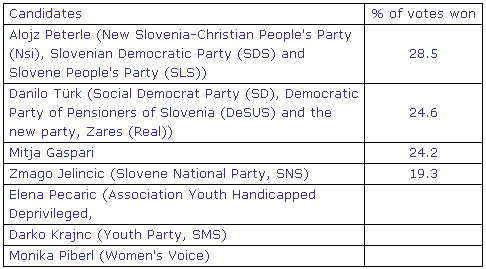News
Corinne Deloy,
Fondation Robert Schuman,
Helen Levy
-

Available versions :
EN

Corinne Deloy
Fondation Robert Schuman
Helen Levy
Alojz Peterle, the candidate supported by the three government parties – New Slovenia-Christian People's Party (Nsi), the Slovenian Democratic Party (SDS) and the Slovene People's Party (SLS) – won the first round of the Presidential election that took place in Slovenia on 21st October. He won 28.5% of the vote in comparison with 24.6% for Danilo Türk, the opposition's candidate, supported by the Social Democrat Party (SD), the Democratic Party of Pensioners of Slovenia (DeSUS) and the new party, Zares (Real), established on 6th October by several independent MPs, former members of the Liberal Democrat Party. Danilo Türk led at least one point over the former governor of the Central Bank and former Finance Minister (1992-2000), Mitja Gaspari, who won 24.2%. In 4th position comes the far-right candidate Zmago Jelincic supported by the Slovene National Party (SNS), with 19.31% of the vote.
Turnout rose to 57%, greatly below the figure recorded in the first round of the last presidential election on 10th November 2002 (- 15 points).
The score achieved by Alojz Peterle is lower than forecast by most pre-electoral polls which had guaranteed him victory in the second round also. On 11th November voters in favour of the left, divided in the first round and who enjoy the majority in the country according to the polls might very well rally to Danilo Türk. The latter, not as well known as the former Prime Minister, has succeeded in attracting opponents to the present government to his name. "Alojz Peterle seems to be the grand loser in this first round, which heralds the second electoral setback in one year for Prime Minister Janez Jansa – after the loss of the capital Ljubljana in the local elections on 22nd October and 12th November 2006. It will be difficult for him to rally new voters in the second round," maintains political expert Vlado Miheljak.
Between 1990 and 1992 Alojz Peterle was the head of the first democratic government elected in Slovenia which formalised the country's independence in 1991. He led the Democrat Party for nearly 20 years before the latter merged with other parties. Alojz Peterle, an MEP, was elected in March 2006 to a year three-year term as vice president of the European People's Party (EPP). During the electoral campaign he put himself forward as "a man of the people" hoping to distinguish himself from Janez Jansa's government which has been having problems in the polls. "We Slovenians can be different but we should not disagree on important subjects," he repeated, promising to establish "relations of co-operation and not competition" with the Prime Minister. "Slovenia has an opportunity to finally have the President it deserves," stressed the Head of Government Janez Jansa (SDS) as he went to vote. The Prime Minister even said he thought Alojz Peterle could "surprise everyone" and "be elected in the first round."
The electoral campaign focussed on the candidates' personalities each carefully avoiding confrontation and questions which according to the polls worry the Slovenians such as price rises and the border conflict with Croatia. "The fight was even because of the quality of the candidates and the result is tight," declared Alojz Peterle on TV after the first results were announced.
Since its independence in 1991 Slovenia has only had two Presidents, Milan Kucan (1991-2002) and Janez Drnovsek (2002-2007), both members of leftwing organisations. Danilo Türk who is a professor of international law at the University of Ljubljana, a former UN diplomat and former advisor to UN Secretary General Kofi Annan 2002-2005, might continue this tradition unless Alojz Peterle wins on 11th November to become the first Head of State from a centre-right party.
"I am expecting a very closely run second round," stresses Borut Hocevar, a political analyst at the daily Zurnal 24 adding "Although the President of the Republic does not have much power in Slovenia this election is important because it is an indicator of the country's political trend as the general elections approach next year."
Results of the first round of the presidential election 21st October 2007 in Slovenia
Turnout: 57%
 Source: Agence France-Presse
Source: Agence France-PresseOn the same theme
To go further
Elections in Europe
Corinne Deloy
—
15 April 2025
Elections in Europe
Corinne Deloy
—
25 February 2025
Elections in Europe
Corinne Deloy
—
18 February 2025
Elections in Europe
Corinne Deloy
—
28 January 2025

The Letter
Schuman
European news of the week
Unique in its genre, with its 200,000 subscribers and its editions in 6 languages (French, English, German, Spanish, Polish and Ukrainian), it has brought to you, for 15 years, a summary of European news, more needed now than ever
Versions :



